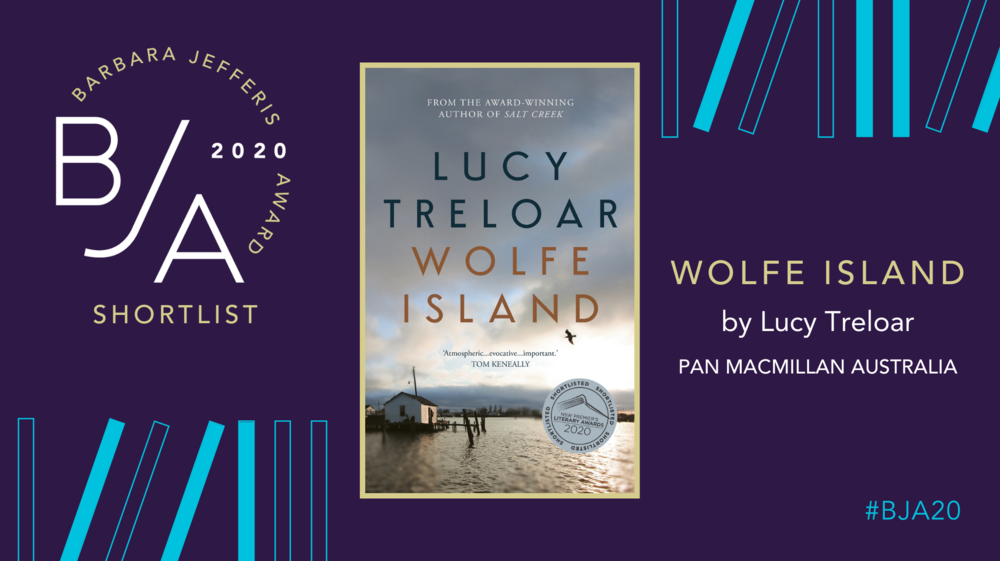30.10.20
 Lucy Treloar on Wolfe Island, shortlisted for the 2020 Barbara Jefferis Award.
Lucy Treloar on Wolfe Island, shortlisted for the 2020 Barbara Jefferis Award.
How did you start writing?
I grew up in a very bookish family, and was a secret writer as a child. I gave up in disgust at the results, at eight, and attempted a couple of novels in my 20s and fell into a similar state of despair. I thought that if I were truly a writer, it would be easy. Later, I did a writing and editing course. It saved me, really. I felt bent out of shape by the teaching I’d been doing. I told myself the course was to improve my editing skills, but it was always the writing I was drawn to. I had a few children’s chapter books published, and by then, with all those other people around me struggling too, I’d realised that writing was work, real work, that didn’t come especially easily to anyone and I began a novel. Better to try and fail than not to try at all was my reasoning. Bitterness would lie at the end of not trying. I really worked at it. I’d always gravitated towards writing: looking back that was clear. It was learning what writing meant that changed things. I could do the work, and I got better fairly quickly, and that feeling of finally getting somewhere made such a difference.
What inspired you to write Wolfe Island?
Procrastination! It was quite a simple thing that started Wolfe Island. I was avoiding some real work one day and came across an online image of the last house on an island that was dissolving into the Chesapeake Bay. I knew, with a shiver of recognition, that it was my next book. And before a minute had passed, I had a character, already fairly well formed, standing in the upstairs window, a solitary figure looking down on her disintegrating world. Everything developed from that. I suppose I’d been thinking about disintegration generally (geo-politically, environmentally, socially), but I wasn’t consciously thinking of those things in terms of future writing. The image I think connected with my subconscious.
In what ways do you think Kitty Hawke might be an empowering figure for women and young girls?
Kitty is resourceful, and deeply independent. When in trouble, she doesn’t turn to a man for help. She presumes that she is up to any task. I’m not a polemical writer. I don’t think about writing in terms of the messages that it might carry. But in Kitty, her daughter Claudie and her granddaughter Cat, I hope it’s evident that these women are at the centre of their own worlds, not orbiting the worlds of men. They have their own drives and aims, which men are to an extent on the periphery of. I’ve had a few men judge Kitty as a negligent mother, as selfish and hard. Respectfully, I disagree. To me, she shows the difficulties that can exist for women in realising themselves when they have a partner and family and the responsibilities that go along with that (even if they’re shared with the partner). Be yourself first, don’t find your meaning in life from your attachment to men. Kitty lives that belief. Kitty embodies self-sufficiency, but she is still open to love and connection when it arrives, and she is the line that the narrative follows. Wolfe Island is her story, and the end point is not a resolution involving a man. It’s about women looking after each other, the ways women hold each other up and support each other in the world.
What was the most challenging thing about writing this book?
At the time I started writing, everyone thought Hilary Clinton would be elected president of the USA. My book was going to be much more about the environment of the Chesapeake Bay, the book’s principal setting. I went on a couple of research trips to the US during the development phase of Wolfe Island, the first trip in the week after Trump’s inauguration in 2017. Already, the whole country was off-kilter, and its social and political trajectories were changing. Everyone was unsettled. The entire second half of the book developed as a result of Trump being elected, as his demonisation and horrific treatment of refugees intensified. The rapidity of the change was a challenge to keep accommodating. I wanted his effects – already being strongly felt, and which I projected into what I saw as a probable future – to be present in the book, but not him. He’s a black hole that swallows everything, and it was an effort to stop this happening.
Which Australian authors have been influential on your writing?
There are so many Australian authors I admire. Helen Garner for her amazing observational capabilities, her quiet revelations, her perfect imagery, her rage. I love an emphasis on landscape and setting in novels, and this is something that Kim Scott is brilliant at – along with all the other things he does so well. For me a sense of place really matters. The relationship between people and the landscapes they live within is such a rich vein to explore. We are made by each other. The elegance of Jane Rawson’s writing is always something to aspire to. She’s one of Australia’s finest wordsmiths. And Josephine Rowe’s short stories are wonderful. I’m still absorbing them.
Keep up-to-date with ASA advocacy, support and advice
with our fortnightly newsletter.